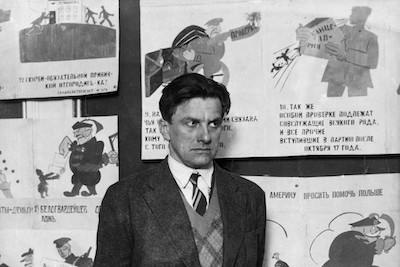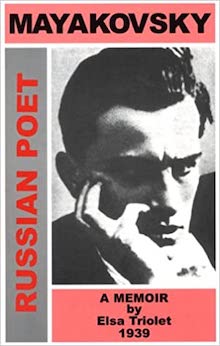Elsa Triolet’s short memoir of Vladimir Mayakovsky gives both an intimate view of the man and a broader sense of the stature he enjoyed in his time. What intrigued me most, however, was the chapter about a little book he wrote, How Verses Are Made.
Mayakovsky didn’t care to analyze verse technique. He claimed, “I know nothing about iambics or trochaics and have no interest in the subject. […] The preparatory work for a poem is a continuous activity [and] a large number of ‘poetic reserves’ at your disposal.”
Triolet points out:
He never worked sitting at a table with a pen in his hand. He worked wherever he was, from morning to night: in the street — where he’d roam around for hours; during conversations; while flirting with women … whatever he was doing he brought his work along, too, in his mind.”
His memory was so prodigious that he “not only knew all his own poetry by heart (and that was several books by the end of his life) but also volumes of other poetry both ancient and modern.”
At the beginning of his poetic career he ‘wrote’ — if you can call it that — all his poems completely in his head, in his memory. A poem that he’d change ten, even a hundred times, would undergo all those transformations in his head. He crossed out, altered, rewrote a 1500-line poem all in his mind and had perfect recall of each version. And what he eventually committed to paper would be the final draft after a series of drafts which he’d sometimes worked on for months.”
Which is not to say he didn’t jot down preliminary ideas to use for poems. In fact, “he started noting down words, sentences and verses in his precious pocket-books — calling them his ‘poetic reserves.'”
So what were they? Rhymes, alliterations, images, themes, ideas. Three examples: an image of “the rain in New York”; another of “an elderly toilet attendant in an enormous restaurant in Berlin”; the idea of “an American song that needs to be adapted and Russified.”
All these reserves are stored in my head, the most complicated in my pocket-book. I never know how I’m going to use them. Preparing these reserves takes up all my time. I spend between 10 and 18 hours a day on them and I’m always muttering something. It’s this level of concentration that’s responsible for the notorious absent-mindedness of poets.
Despite putting in so much time, he said his “normal output, for work in progress, is just 8 to 10 lines a day.” You can understand why from his famous poem “Cloud in Trousers”:

I used to think that books were made like this: A poet arrives opens his lips with no effort and straight away this simpleton, inspired, brings forth a song to order. But in truth before they start singing poets tramp about for ages getting corns while the silly flounder of imagination undulates in the ooze of the heart.


In 1991 I lived across the street from the massive statue of Mayakovsky in Moscow. Some nights you could hear his giant footsteps plodding through the frozen streets
He was a giant. Some say he killed himself because he was betrayed by the revolution
Some say it was over a woman
If he were living he would not stand for what is going on in his country today.
thnx for yr comment, cody. this was the statue, yes?
https://rusmania.com/central/moscow-federal-city/moscow/tverskoy/beyond-the-garden-ring-around-ulitsa-1-ya-tverskaya-yamskaya/vladimir-mayakovsky-monument